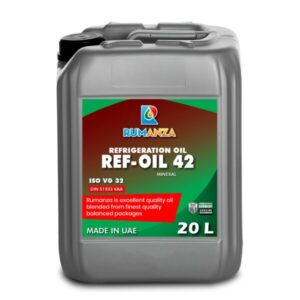Refrigeration Oils Explained: Choosing the Best for Your System
Understanding Refrigeration Oils
Refrigeration oils, often referred to as compressor oils, are specialized lubricants designed to withstand low temperatures, high pressures, and the unique conditions within refrigeration systems. These oils lubricate the compressor’s moving parts, minimize wear, and support efficient heat transfer. The right refrigeration oil not only improves system performance but also extends its lifespan by reducing energy consumption and protecting against rust and corrosion.
Key Roles of Refrigeration Oil
- Lubricates internal components to reduce friction.
- Ensures efficient heat transfer within the system.
- Prevents corrosion and oxidation of metal surfaces.
- Enhances the overall durability and energy efficiency of the system.
Refrigeration Oil Types
The variety of lubricants used in refrigeration system available today are classified based on their base oil composition and their suitability for different refrigerants. The main refrigerant oil types are:
Mineral Oil: Traditional mineral oils are derived from refined petroleum. They are compatible with older CFC (chlorofluorocarbon) and HCFC (hydrochlorofluorocarbon) refrigerants, such as R-22 and R-12. Although economical, mineral oils are less compatible with modern refrigerants.
Alkylbenzene Oil (AB Oil): Known for its excellent stability and miscibility with HCFC refrigerants, AB oils offer superior oxidation resistance, making them suitable for both low and high-temperature applications. However, they are less compatible with newer refrigerants like HFCs.
Polyalkylene Glycol (PAG) Oil: Highly effective for HFC refrigerants, PAG oils are commonly used in automotive air conditioning systems. They offer good lubricity and thermal stability but are highly hygroscopic (attract moisture), which can lead to corrosion if not properly managed.
Polyol Ester (POE) Oil: The anti-wear polyolester oils most versatile and widely used refrigeration oil today, POE oils are compatible with HFC and HCFC refrigerants, making them suitable for modern systems. POE oils have high thermal stability and offer excellent lubricity, though they are also hygroscopic.
Polyvinyl Ether (PVE) Oil: An alternative to POE oil, PVE oils are compatible with HFC refrigerants, providing excellent lubrication and water resistance. They are primarily used in Japanese air conditioning systems but are gaining global popularity.
Refrigerant Oil Properties When Selecting Refrigeration Oils
Choosing the right refrigeration oil requires an understanding of key properties that impact performance, including pve oil vs poe oil:
Viscosity: A measure of the oil’s thickness, viscosity affects the oil’s flow rate and lubrication capabilities. Higher viscosity oils provide better film strength but may hinder flow in low-temperature environments. The ideal viscosity varies based on the compressor type and operating conditions.
Pour Point: The pour point is the lowest temperature at which the oil can flow. For refrigeration systems, particularly those in sub-zero environments, choosing an oil with a low pour point prevents clogging and ensures smooth operation.
Dielectric Strength: This refers to the oil’s ability to insulate against electrical breakdown, a critical factor for systems with high-voltage compressors. Oils with high dielectric strength protect components from electrical shorts and improve safety.
Thermal and Oxidation Stability: Oils exposed to high temperatures risk oxidation, which can form sludge and acids that damage the system. Refrigeration oils should possess high thermal and oxidation stability to withstand extreme conditions without degradation.
Moisture Resistance: Given the moisture-sensitive nature of refrigeration systems, especially with hygroscopic oils, it’s vital to use oils with low moisture absorption. Excess moisture can freeze in the system, leading to blockages and corrosion.
Rumanza Oil Typical Properties

| PARAMETERS | TEST METHOD | UNIT | REF-42 | |||
| Grade | 32 | 46 | 68 | 100 | ||
| Refrigerator Oil Group | DIN – 51503 | – | KAA, KC, KE | |||
| Kinematic Viscosity @ 104 °F / 40 °C | ASTM D-7042 | cSt | 32 | 46 | 68 | 100 |
| Kinematic Viscosity @ 212 °F / 100 °C | ASTM D-7042 | cSt | 4.6 | 5.6 | 7 | 8.8 |
| Density @ 15 °C | ASTM D-1298 | g/ml | 0.892 | 0.897 | 0.902 | 0.906 |
| Neutralization Value | mgKOH/g | <0.05 | <0.05 | <0.05 | <0.05 | |
| SP. Gravity @15 °C / 60 °F | ASTM D-4052 | g/cm3 | 0.873 | 0.877 | 0.879 | 0.866 |
| Flash Point (min) | ASTM D-92 | °C | 192 | 204 | 216 | 220 |
| Pour Point (max) | ASTM D-97 | °C | -24 | -24 | -21 | -18 |
Compatibility with Refrigerants
The compatibility between refrigerant oils and refrigerants is essential to system performance. Incompatible oils can cause chemical reactions, leading to sludge formation, acid buildup, and impaired lubrication. Each refrigerant type has unique characteristics that require specific oils to maintain stability, refrigeration lubricants, and efficiency. For example:
- HFC Refrigerants (like R-134a, R-410A): These commonly use POE and PVE oils, as traditional mineral oils or AB oils are incompatible.
- HCFC Refrigerants (like R-22): Compatible with AB and mineral oils.
- Natural Refrigerants (such as ammonia, CO₂): Require specialized oils like PAO (polyalphaolefin) or other synthetic oils due to their non-hygroscopic nature and compatibility with extreme operating conditions.
Factors to Consider When Choosing Refrigeration Oil
To select the best refrigerant lubricant oil for your system, consider these critical factors:
System Type and Age: Older systems often require mineral or AB oils, while newer systems with HFC refrigerants may use POE or PVE oils. Choosing an oil that matches your system’s compatibility requirements ensures efficiency and longevity.
Operating Environment: Extreme temperatures, high humidity, or corrosive conditions demand oils with low pour points, high oxidation resistance, and moisture resistance to maintain system integrity.
Oil Miscibility: Miscibility, or how well the oil blends with the refrigerant, is essential to maintain proper lubrication and efficient oil return in the system. Using incompatible oils can lead to lubricant separation, compromising the compressor’s performance.
Cost and Maintenance: Higher-quality oils may cost more but offer better system protection and longer intervals between oil changes. Opting for quality oils reduces overall maintenance expenses by minimizing wear and extending component life.
Maintenance and Regular Oil Checks
Routine maintenance is essential for refrigeration compressor oil types or systems, and regular oil checks play a significant part in ensuring optimal performance. Monitoring oil levels, viscosity, and color helps in early identification of potential issues like oil degradation or contamination. Regularly replacing the oil, particularly when moisture or acid levels rise, can prevent costly repairs and extend the life of the refrigeration system.
Tips for Maintenance:
- Perform regular checks for oil acidity and contamination.
- Replace oil filters periodically to avoid clogging and buildup.
- Monitor refrigerant levels to ensure oil miscibility and avoid separation issues.
Benefits of Using Quality Refrigeration Oil
Investing in high-quality refrigeration oil brings numerous advantages, including:
- Enhanced System Efficiency: Proper lubrication reduces friction, lowering energy consumption and operational costs.
- Extended Equipment Lifespan: Quality oils minimize wear and corrosion, reducing the likelihood of system failures.
- Reduced Maintenance Costs: High-performance oils require fewer replacements, translating to lower maintenance expenses.
- Environmental Compliance: Many modern refrigeration oils are designed to be eco-friendly, supporting compliance with environmental regulations.
Choosing the Best Refrigeration Oil for Your System
With many options available, choosing the best refrigeration oil depends on evaluating your specific system requirements, refrigerant type, and environmental factors. High-performance oils, such as POE and PVE, are recommended for most modern systems due to their compatibility with common refrigerants, while mineral and AB oils remain popular for older systems. Consulting your system’s manufacturer or a refrigeration professional can provide additional guidance on the best oil choice, helping you optimize performance and ensure durability.
Top Choices by System Type:
- Domestic and Light Commercial Systems: POE and PVE oils for HFC refrigerants.
- Industrial Refrigeration: PAO or specially formulated synthetic oils for ammonia and CO₂ systems.
- Automotive Air Conditioning: PAG oils for durability and temperature resilience in automotive compressors.
Final Thoughts
Refrigeration oils are essential to the health and performance of your all types refrigeration system like industrial refrigeration oil system etc, impacting everything from energy efficiency to component durability. By understanding the different types of refrigeration oils, their properties, and compatibility with refrigerants, you can make an informed choice that optimizes your system’s functionality. Whether you’re maintaining an older unit or investing in a new one, selecting the right oil is a proactive step towards ensuring reliable, long-lasting operation.
FAQs
Refrigeration oil is a specialized lubricant used in refrigeration and air conditioning compressors to reduce friction, prevent corrosion, and enhance heat transfer. Choosing the right refrigeration oil is essential because it ensures efficient performance, prolongs system life, and minimizes energy consumption.
Refrigerant oil testing provides a critical early warning system by analyzing the lubricant to detect internal wear, contamination, and acid formation, preventing costly compressor failures and unplanned downtime through proactive maintenance.
Polyolester (POE) oil is the standard lubricant used with most HFC refrigeration systems. It is specifically formulated to be miscible (able to mix thoroughly) with HFC refrigerants, ensuring proper lubrication is returned to the compressor. This characteristic makes it the essential replacement for the mineral oils used with older refrigerants.
The main types of refrigeration oils include mineral oils, alkylbenzene (AB) oils, polyalkylene glycol (PAG) oils, polyol ester (POE) oils, and polyvinyl ether (PVE) oils. The best choice depends on your system type, the refrigerant used, and the operating environment. Consulting your system’s manufacturer for specific recommendations is also helpful.
Each refrigerant type has unique characteristics that determine its compatibility with specific oils. For example, HFC refrigerants like R-134a work best with POE and PVE oils, while older HCFC refrigerants, such as R-22, are compatible with mineral or AB oils. Using an incompatible oil can lead to chemical reactions, sludge formation, and compromised system efficiency.
Viscosity measures the thickness or flow resistance of oil. In refrigeration systems, viscosity affects the oil’s ability to lubricate and flow through the compressor. Choosing the right viscosity ensures proper lubrication without clogging the system, especially in low-temperature environments.
Refrigeration oils that absorb moisture can form acids and cause corrosion, freezing, and other damage within the system. Oils like POE and PAG are more hygroscopic, meaning they readily attract moisture. Using the correct storage and handling practices can minimize moisture exposure and protect your system.

Radiator Stop Leak UAE: Quick Fix for Vehicle Cooling System Leaks
Radiator Stop Leak UAE: Quick Fix for Vehicle Cooling System Leaks Discover More Introduction: The Unforgiving UAE Climate and Your Vehicle’s Lifeline The United Arab Emirates’ automotive landscape is defined by extremes. Ambient temperatures that regularly surpass 45°C (113°F), coupled with intense urban congestion and long, high-speed desert drives, create a perfect storm of thermal stress for every vehicle. In this environment, your engine cooling system is not merely a subsystem; it is the single most critical component preventing catastrophic engine failure.

What Type of Transmission Oil in UAE Does My Car Need? Your Complete Guide
What Type of Transmission Oil in UAE Does My Car Need? Your Complete Guide Discover More Navigating the vast, sun-baked highways of the United Arab Emirates—from the dynamic urban sprawls of Dubai and Abu Dhabi to the majestic desert dunes and the tranquil mountain passes of the Hajar range—places extraordinary mechanical and thermal stress on every component of your vehicle. While conscientious drivers often prioritize engine oil changes, the vital lifeblood safeguarding the transmission, the complex heart of your car’s

Guide to UAE Turbine Oil Selection Application & Management for Industrial Facilities
Guide to UAE Turbine Oil Selection, Application, and Management for Industrial Facilities Discover More In the hyper-competitive industrial landscape of the United Arab Emirates, where operational excellence directly translates to economic advantage, turbine lubrication represents a critical nexus of reliability engineering and strategic asset management. This comprehensive guide, developed with technical insights from Rumanza Lubricants, provides an unprecedented deep dive into the science, selection criteria, and life-cycle management of turbine oils specifically engineered for the extreme operating conditions of the

Synthetic vs. Mineral Hydraulic Oil in UAE : Which is Best for Your Operation?
Synthetic vs. Mineral Hydraulic Oil in UAE : Which is Best for Your Operation? Discover More Across the dynamic landscape of the United Arab Emirates—from the megaprojects of Dubai Marina to the intricate conveyor systems of Jebel Ali Port, from the massive hydraulic shovels in Al Dhafra quarries to the precision automated lines in Abu Dhabi’s industrial cities—the silent, powerful force of hydraulics is indispensable. These systems convert fluid power into monumental force and precise motion. At the core of

What is a Pour Point Depressant? | Benefits, Uses & How It Works Mechanism
What is a Pour Point Depressant? | Benefits, Uses & How It Works Mechanism Discover More In the intricate world of lubricant formulation, few additives play as critical yet understated a role in cold-weather operability as Pour Point Depressants (PPDs). These specialized chemical compounds are the linchpin that prevents machinery from seizing up when temperatures plummet. This in-depth guide goes beyond the basics, exploring the sophisticated chemistry, detailed mechanism, nuanced benefits, and practical considerations of PPDs. We will also examine the

Guide to Gasoline Engine Oils for UAE’s Extreme Climate: Engineering Peak Performance
Gasoline Engine Oils for UAE’s Extreme Climate: Engineering Peak Performance Discover More In the heart of the Arabian Peninsula, the United Arab Emirates stands as a testament to human ambition, with its engineering marvels and endless highways. Yet, this environment of soaring achievement is also one of the most punishing on Earth for machinery. For your vehicle—whether a nimble city sedan, a powerful family SUV, or a high-performance sports car—the UAE’s climate is a relentless adversary. The choice of engine

What are Polyol Ester Oils & Lubricants – Properties & Applications
What are Polyol Ester Oils & Lubricants – Properties & Applications Discover More In the intricate world of industrial machinery, automotive engines, and advanced refrigeration systems, the choice of lubricant is not merely a maintenance task—it’s a critical engineering decision. While conventional mineral oils have served us for over a century, the demands of modern technology require fluids that can perform under extreme pressure, temperature, and environmental stress. This is where synthetic lubricants, specifically Polyol Ester oils, come to the forefront.

Guide to Choosing the Right Lithium Complex Grease in UAE
Guide to Choosing the Right Lithium Complex Grease in UAE for Unbeatable Performance Discover More In the heart of a region defined by its ambition and extreme climate, the machinery that builds and powers the UAE operates under immense pressure. From the towering cranes sculpting Dubai’s skyline to the massive haul trucks in Abu Dhabi’s industrial zones and the relentless conveyor systems in Jebel Ali Port, every moving part is a critical link in the chain of progress. Protecting these